Site Menu:
| This is an archived Horseadvice.com Discussion. The parent article and menus are available on the navigation menu below: |
| HorseAdvice.com » Diseases of Horses » Foal Diseases » Discussions on Foal Diseases not covered above » |
| Discussion on Structural issues caused by mare's malnutrition? | |
| Author | Message |
| New Member: Lasparks |
Posted on Monday, Aug 14, 2006 - 3:55 pm: Newbie here - My mare foaled on 7/14/06. She is 13, and this was her first foal (and mine). She is boarded at a "friend's" house who also owns the stallion. During the mare's pregnancy, we discovered that our mare and the rest of the horses were getting fed round bales that were quite moldy. My mare actually lost weight during her pregnancy, though that was not entirely evident until the foal was born. She is continuing to lose weight due to the fact that the pasture where she is boarded is sparse (we live in Michigan), and the "friend" seems to think that a mare just gets brought down by her foal and that increasing the feed doesn't help that much. I had a 1200 pound foundation bred quarter horse mare that I can now feel her spine from her poll to her tail, all her ribs and bones in her shoulders. She she is built wide, so she doesn't "look" as thin as she feels, though she is getting ewe necked now. Beyond those serious issues, my question is that my colt was born over at the knees, monkey mouthed, and herniated in his umbilicus and scrotum (which has resolved). He also ended up with pneumonia within 24 hours of his birth, which the vet treated with an antibiotic. My "friend" is trying to tell me that this is genetic and I shouldn't breed my mare again, while in the same sentence telling me my mare is "fine" and there is nothing to worry about as far as her weight. The research I've done to this point points to nutritional issues with the mare during her pregnancy. I am trying to move them, but two days ago a horse died of strangles in her barn. I can't in good conscience just pick them up and move them to a new barn because they have been exposed now. It has been 4 weeks and she hasn't increased the mare's feed as I have insisted because she doesn't think it's a problem. (I know there are multiple issues here). Can you tell me if there is a nutritional basis for my colt's structural issues? He is beautiful otherwise, got right up and nursed, gets around well, etc. He is stiff on his front due to his knee problems. He also has a thickness or swelling right underneath both of his knees that concerns me. Not sure if we are causing him other issues now? Maybe if I can convince her that his problems are nutritional, she may take me more seriously. Thanks in advance for your help...PS-> Mare was bred on 7/21/05, so she kept him almost a full year.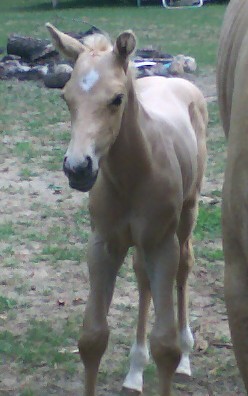 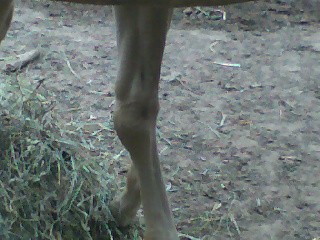
|
| Member: Eoeo |
Posted on Monday, Aug 14, 2006 - 4:17 pm: If I were you I would get them moved as soon as possible. You can give 1 cc of selenium to the foal if he hasn't gotten an injection of it yet. I would have the vet do it as you sound pretty new to the horse business. Go get a good mare and foal grain ration and start her on it. Go feed the grain and good quality hay to this mare yourself, twice a day as obviously this horse person is cheap, unknowlegeable, ignorant of what a horse needs or all of the above. Moldy hay is NEVER fed to any horse at any time. The mare problably has some toxins to deal with from the poor quality of hay. You are lucky you didn't lose her or the foal. Without the proper minerals and vitamins you end up with a poor conditioned mare and foal.Don't breed her back this year, get her the heck out of there and on a good feed program and let her get her system back up and going before you stress her system again. Good luck. EO |
| Member: Christel |
Posted on Monday, Aug 14, 2006 - 4:48 pm: Leslie, beautiful foal, I would be concerned too about his knees. His condition other than that looks good. Can you post pics of mare and the FQH?There are some great articles here on nutrition for mare and foal, look to the left in- care of horses, nutrition. Be informed before you increase or change feed. Good Luck, Chris |
| Member: Banthony |
Posted on Monday, Aug 14, 2006 - 4:54 pm: I second EO.Go buy feed and feed the mare yourself. She should have a good quality hay free choice. Make sure she also has a mineral salt block. Move her ASAP. This person is not a friend nor a horseperson. What they did was cruel and ignorant. |
| Member: Ejar |
Posted on Monday, Aug 14, 2006 - 5:08 pm: Another vote for moving immediately (like today, or even now). An ounce of prevention...Erin |
| Member: Jockyrdg |
Posted on Monday, Aug 14, 2006 - 5:49 pm: Leslie;My comments concern only your mare's nutrition at this point. The past is just that and appropriate comments have already been made regarding it. The general consensus among breeders is that once a mare foals you are not going to get weight on her until the foal is weaned. This is another reason to be sure the mare is optimum when foaling. She is also having to provide a large amount of calcium to the foal while nursing so a rich calcium source is important. Just as an example, the nutritional requirement of digestible energy for a pregnant mare in her 11th month is 19.7 Mcals with 37grams of calcium. Once the Mare is lactating it shoots to 28.3Mcals with 56grams of Calcium. (1100 pound basis, National Resource Council recommendations. This is industry standard) Alfalfa is a fabulous feed for broodmare's if there is no other dietary condition which would prohibit it. It is a rich source of calcium and high in calories. Alfalfa cubes are easy to carry in your trunk if you are in a position where you will have to ensure feeding this yourself. There is much discussion on wet vs dry cubes; with a curious foal by her side I would opt for wet, mushed cubes in case he decides to sample, the extra moisture is good for her as well. Remember to start slowly when adding this feed. You can pretty much deal by weight with cubes i.e. if you wanted to up your mare to 10 more pounds of hay you can give her 10 more pounds of cubes. Keep in mind Alfalfa has more calories ounce for ounce than grass hay, but it's not double. He looks adorable. The most positive thing you can take from this experience is that when your gut says something is wrong - something is wrong. Believe in yourself and stand up for your animals. Remember, no one else is going to pay your vet bills; my pocketbook always gives me courage. |
| Member: Hwood |
Posted on Monday, Aug 14, 2006 - 6:03 pm: Great points, Beverly.A tough way to learn, Leslie, but it seems you are well on your way. He is an adorable foal. I have heard that when a pregnant mare is suffering from poor nutrition, the best of what she gets goes to the foal, resulting in decreased condition for the mare. You will find good info on this site, and many members who have raised many foals through all kinds of situations. Welcome to HA and please keep us informed as to your mare's and foal's progress. Where are you located in MI? Maybe there are folks on the site who can direct you to a better boarding facility. |
| Member: Ajudson1 |
Posted on Monday, Aug 14, 2006 - 7:44 pm: I am in MI too,(upper) where are you? Upper or lower Peninsula?It's sad, but I can think of 2 places right off hand up here that care for their brood mares like yours was cared for. I would also move your horses ASAP and get them on a good mare/foal feed. Also Purina makes a product called Animax, it's safe for animals other than horses. I used it when we bought a bred mare who was very thin. I believe, if Purina still makes it, that it helps with milk production as well as provides extra safe calories. Check with a Purina dealer as it may be called some thing else now. |
| New Member: Lasparks |
Posted on Tuesday, Aug 15, 2006 - 12:17 am: Thanks for all the advice, everyone. I am not new to horses or breeding (AKC Champion Rottweilers), but I am new to breeding horses. I am angry and upset about it all because my trust was betrayed, not to mention the fact that I am being told everything is "OK" and that is just "what happens to a nursing mare" when I know that is wrong. Probably a topic for a different forum! Anyway, we are actively working to move her ASAP, the complication to that is her exposure to strangles - though she is not showing symptoms. I was afraid to move her so late in her pregnancy when I discovered this initially, and the foal is just 4 weeks old now. I know sometimes people move them pretty early, but I wasn't sure how early. I did not breed her back because I didn't like her condition when the foal was born. I also found out just today that there were no mineral blocks in her pastures during most of this past year while she has been there. I had seen other mineral blocks before and assumed there were enough. I only found out because I saw there wasn't one in the pasture she was in and brought one out for her. This "friend" had never given me a reason to question her on any of this, reassured me that my mare would be taken care of, etc., so that is why she was there to begin with, in case any of you were wondering!What is the consensus on a horse's exposure to strangles? How long before you would feel safe bringing a horse to your barn that you knew had been exposed? Also, I thought maybe my foal was born hypothyroid - I know there is an article on here about it (that's actually how I found this site). Anyone dealt with anything similar to these issues with the foal? Anyone had a foal with a similar knee issue that turned out OK? I had initially wanted something to show, but now I hope I can just ride him someday (he will definitely be gelded). Thanks on the "cute" comments, he is pretty special to me. If it wasn't for his knee problem, I would be just so pleased with him, his conformation is very good otherwise. His monkey mouth seems to be resolving a little more every week.... |
| Moderator: DrO |
Posted on Tuesday, Aug 15, 2006 - 7:23 am: Welcome Leslie,It is certainly possible this foal could turn out normal but his best chance is diagnosis by a veterinarian, including radiography. The enlarged knees and varus deformity can be caused by several different conditions that have different treatments and prognosis. For more on this I would review the articles:
We discuss persistence and moving horses with potential Strangles exposure at Diseases of Horses » Respiratory System » Strangles & Streptococcus equi. DrO |
| Member: Jockyrdg |
Posted on Tuesday, Aug 15, 2006 - 7:28 am: Just curious Leslie;Do you have a regular vet you work with? Often a vet can help you find a place to put a contagious (or unknown contagious) horse. If she is exposed to strangles she could be asymptomatic for awhile and then become symptomatic. You may have to get creative or be willing to spend extra dollars for a month to put her at a facility that has a quarantine holding area. Did your mare have regular veterinary care during her pregnancy? If so was it your own vet or the farm's. If the latter I would highly recommend you have or obtain your own vet to do a thorough work up on both. The doctor should be able to guide you best in what the mare needs and to consult on the foals legs. It is worth the money now to get some professional advice instead of trying to figure out it all on your own and spending money on mistakes. There are a lot of things which can affect the foal's skeleton and structure at this age; help now can avoid disaster and huge medical bills in the future.I do recognize that not all breeding situations are attended to with veterinary personnel. You should also review the mare's vaccination and deworming history while at the breeding farm. If it was in the hands of the breeder, you should consider the option that nothing was ever given. With the possibility of Strangles occurring it is even more important to attend to the mare's nutrition, look into some immune boosting supplements, perhaps E and C. It will not prevent her from getting the disease, but could help in her recovery. Unfortunately, you are not alone in having an adventure like this. Many of us have experienced something similar, hence the popularity of this web site. In situations like these you either give up or get smart. Congratulations, it looks like you are getting smart! |
| Member: Banthony |
Posted on Thursday, Aug 17, 2006 - 10:06 am: Leslie,Here is proof that you can put weight on a mare after she has foaled. This mare came to us in very bad condition with a week old foal. 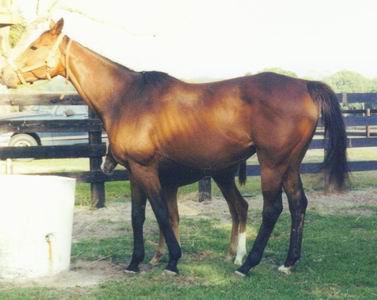 Here is the same mare with a three month old foal. 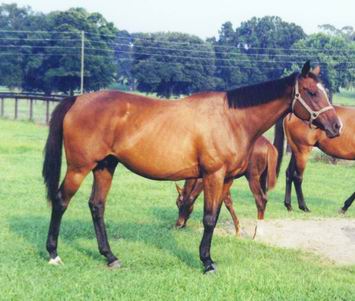
|
| New Member: Lasparks |
Posted on Thursday, Aug 17, 2006 - 3:34 pm: Thank you very much! We are moving them this weekend.... |
| New Member: Lasparks |
Posted on Tuesday, Aug 22, 2006 - 3:59 pm: 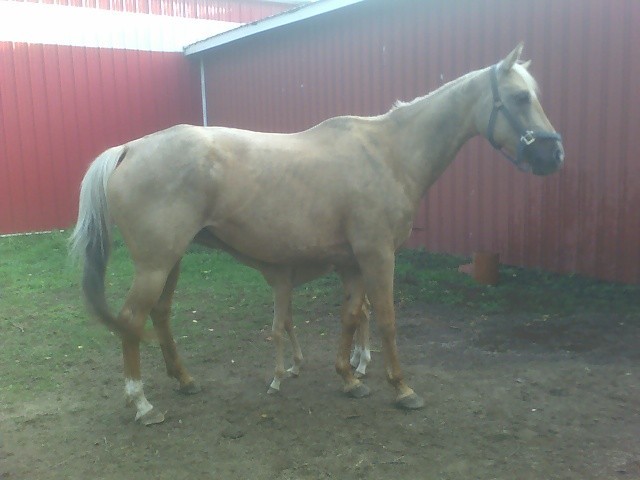 Update: This was the mare before we moved her (actually her colt was two or three weeks old in this photo). Though you can't see them too well because of the lighting in this photo and her coloring, her ribs were very evident and had no fat covering. According to the barn owner where she was boarded she is "just a little ribby". She is at a different farm as of this past Sunday whose owner happens to have the same philosophy as I do on animal care. She has adjusted very well and the colt trailered like a champ. We are having a vet out on Monday to evaluate his knees. We are slowly upping her grain feed, got a high quality alfalfa hay and much better pasture. We have to stall her to keep her from gorging on the pasture, and just let her out for a few hours at a time. She seems to do OK, she has free run in and out of her stall where her hay is otherwise. She seems to self regulate pretty well, but we want to be careful, too. Colt is doing well as far as socialization, we got a halter on him and are working more on the handling aspect. The previous barn's owner (the one who starved my mare) didn't think handling was necessary until they were weaned, so he was basically ignored unless I was out there. I'm just glad I found somewhere safe that would take her and her baby... |
| New Member: Lasparks |
Posted on Tuesday, Aug 22, 2006 - 4:01 pm: PS-> No other horses have shown signs of strangles at the other barn and neither has she. So we vaccinated the other 2 horses at the new barn and have kept them all separated (no contact). The new barn's owner is familiar with strangles, so she knows to wash hands between horses and not share tack, feed, etc. so we will probably be OK on that issue. |
| Member: Kstud |
Posted on Tuesday, Aug 22, 2006 - 5:09 pm: Thats so good to hear that you have found a good barn Leslie, I hope that mare and foal improve soon. I have used a human vitamin/mineral preparation called Abidec in a lot of crooked / weak foals and it has really helped. It is designed for children from birth and so is suitable for young foals, give an eyeDrOpper full daily. The foals love it and come up and ask for it daily. We have a stud here and I have seen some very problematic foals straighten completely with it. We have a low copper problem here which can also cause joint problems, it may be worth asking your local vet if there is a similar problem in your area as the sooner you start to supplement the less chance there is of chronic damage. Other things to consider are Iodine and Selenium /Vitamin E though that manifests more often as muscular weakness than joint abnormalities. Good luck,Catherine |
| Member: Christel |
Posted on Tuesday, Aug 22, 2006 - 5:16 pm: Wow Leslie, poor mare , so glad you were able to move, it will be nice to see the after pics- she will be a beautiful mare when she puts some pounds on. , so glad you were able to move, it will be nice to see the after pics- she will be a beautiful mare when she puts some pounds on. Glad you are getting to enjoy the foal too. Chris |
| Member: Jockyrdg |
Posted on Tuesday, Aug 22, 2006 - 5:22 pm: Leslie;It sounds like you have found a good place for your mare with good care. The future looks bright. Remember to believe in yourself. Glad to hear you're getting a vet involved on the little one. |
| Member: Hwood |
Posted on Tuesday, Aug 22, 2006 - 7:04 pm: Add my best wishes to the bouquet, Lesile. I am very happy for you that you have found a better place for your horses, and hope that your youngster's legs don't suffer any long-lasting effects. Beverly's advice is especially wise . . . go with your gut feelings, and don't feel intimidated by people who tell you that they know better. Hope your new horsey home will be a great place to learn and grow with your horses. |
| Member: Erika |
Posted on Tuesday, Aug 22, 2006 - 9:39 pm: So happy you did what your gut told you, Leslie. Your beautiful mare is lucky that you are watching out for her and her foal. I'm sure you'll see improvement soon. Best of luck with dodging the strangles.Like Holly Wood says, many of us have been through trials like this, and we enjoy supporting one another when difficulties arise. Erika |
| Member: Dawson |
Posted on Wednesday, Aug 23, 2006 - 5:16 pm: Leslie; horse people each have their own opinions on what should be, use your eyes and listen to your gut.Boarding a horse can put you in a difficult position trying to keep the peace and not make waves, over the years I have learned to walk the paddocks my horses graze in several days a week looking for debree or broken fencing. If the feed and hay quality are not what I liked,the amount of shavings are too stingy, or a mineral block is needed. I loaded them up in my car and handle it. Yes, you may hear others say "look at all the shavings her horse has" or "why the special treatment" leave the wrappers behind in the trash so everyone can see that you have purchased these items yourself, and not dipped into the barn supply. I'm not a stuck up person so when I say very few people have ever give my horses the same level of care I do. It's because I love my horses and they are not replaceable. This means I check and re-check everything, then as a border and now that I have my own farm ++FINALLY++ No one person knows it all, so never let anyone make you feel badly that you've asked someone else for advise. PS: Palomino !!! My favorite color, what a pretty foal. |
| Member: Kris197 |
Posted on Wednesday, Aug 23, 2006 - 6:15 pm: Leslie, Where abouts are you in Mi I am also in Michigan, I know this is probably not the place to post this but just wanted to say hi to a fellow Michigander Hi also Angie I see you are in Mi too. Hi also Angie I see you are in Mi too.
|
| Member: Qh4me |
Posted on Friday, Aug 25, 2006 - 1:12 pm: Hi Leslie,Wanted to welcome you to HA and congratulate you on a sweet foal. I am happy to hear you found a more suitable environment for your horses and for your well being as well. Only you know best. I am glad you followed your gut and got them out of the barn they were in. It is always worse when it is "friends" but you are the one who owns the horses, and you are the one that pays the vet bills, so it is your decision on how they need to be treated/fed etc. All of us have to ask for opinions, but when you feel "something" isn't right, it usually isn't. You have to be able to sleep at night knowing your animals are safe and happy. I am sure both you and them will be much happier now. Take care and looking forward to new pics in a few weeks! Shawna |
is The Horseman's Advisor
Helping Thousands of Equestrians, Farriers, and Veterinarians Every Day
All rights reserved, © 1997 -
